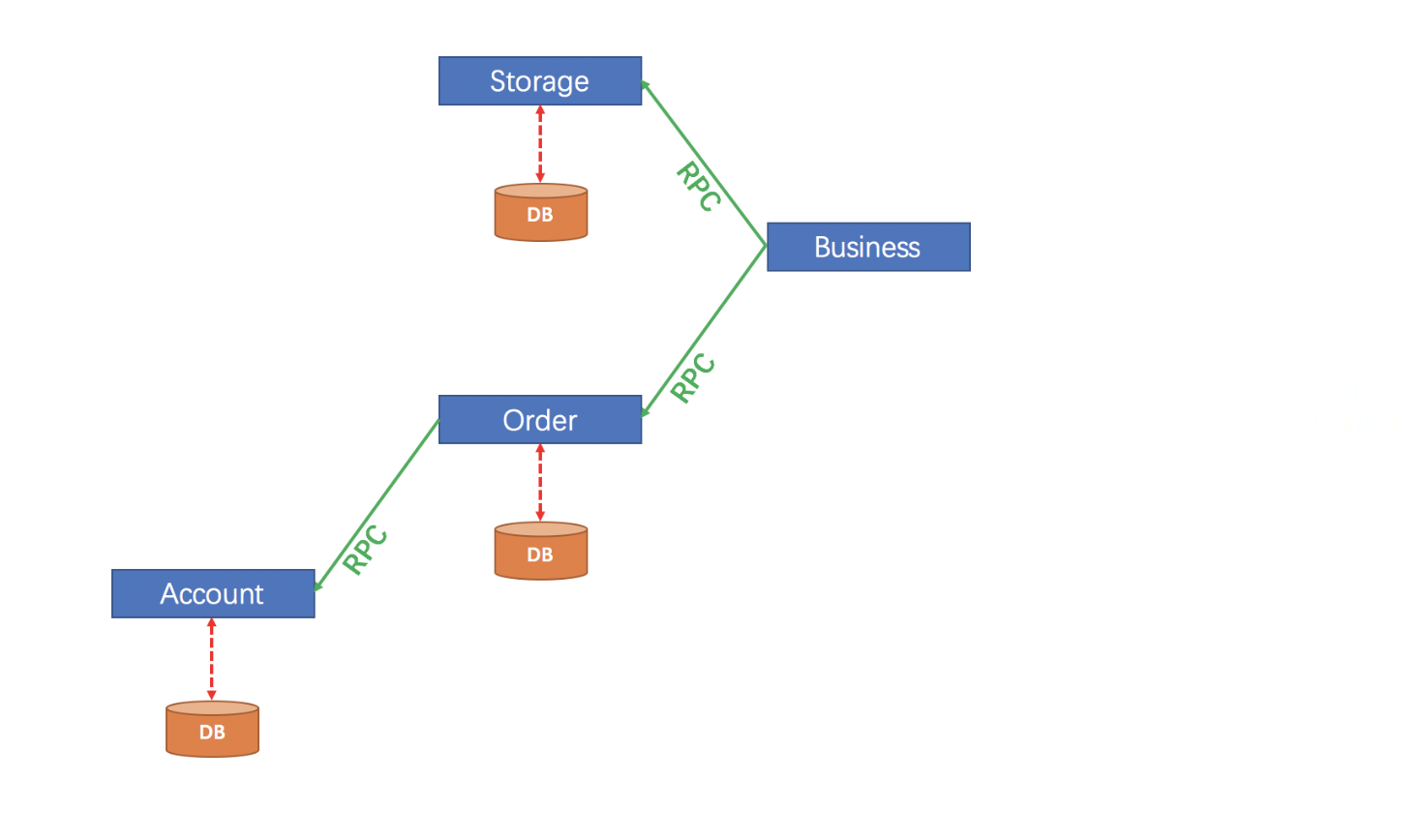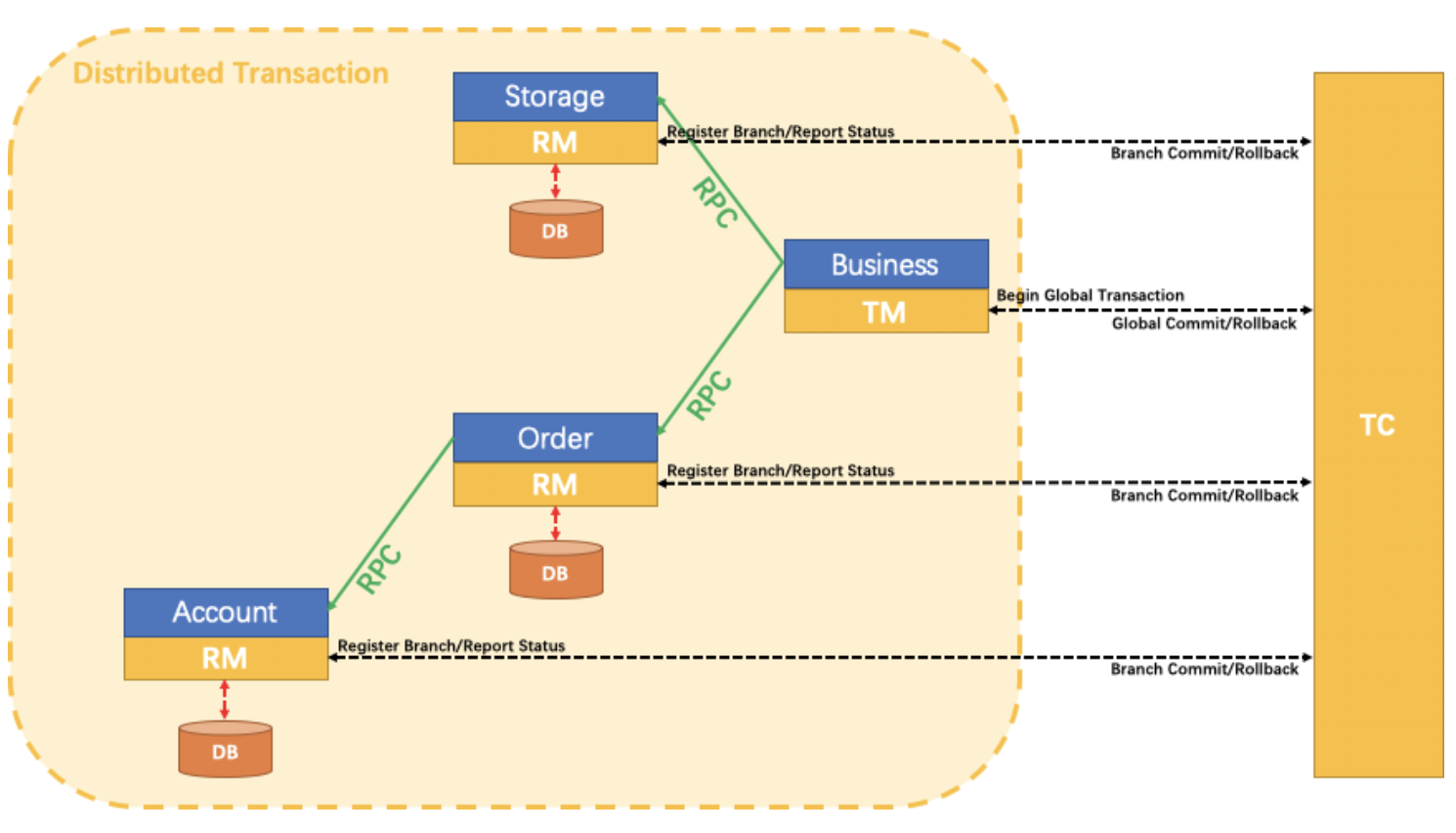该文章内容发布已经超过一年,请注意检查文章中内容是否过时。
如何使用Seata保证Dubbo微服务间的一致性
本文主要介绍如何使用Seata保证Dubbo微服务间的一致性
案例
用户采购商品业务,整个业务包含3个微服务:
- 库存服务: 扣减给定商品的库存数量。
- 订单服务: 根据采购请求生成订单。
- 账户服务: 用户账户金额扣减。
业务结构图

StorageService
public interface StorageService {
/**
* 扣除存储数量
*/
void deduct(String commodityCode, int count);
}
OrderService
public interface OrderService {
/**
* 创建订单
*/
Order create(String userId, String commodityCode, int orderCount);
}
AccountService
public interface AccountService {
/**
* 从用户账户中借出
*/
void debit(String userId, int money);
}
主要的业务逻辑:
public class BusinessServiceImpl implements BusinessService {
private StorageService storageService;
private OrderService orderService;
/**
* 采购
*/
public void purchase(String userId, String commodityCode, int orderCount) {
storageService.deduct(commodityCode, orderCount);
orderService.create(userId, commodityCode, orderCount);
}
}
public class StorageServiceImpl implements StorageService {
private StorageDAO storageDAO;
@Override
public void deduct(String commodityCode, int count) {
Storage storage = new Storage();
storage.setCount(count);
storage.setCommodityCode(commodityCode);
storageDAO.update(storage);
}
}
public class OrderServiceImpl implements OrderService {
private OrderDAO orderDAO;
private AccountService accountService;
public Order create(String userId, String commodityCode, int orderCount) {
int orderMoney = calculate(commodityCode, orderCount);
accountService.debit(userId, orderMoney);
Order order = new Order();
order.userId = userId;
order.commodityCode = commodityCode;
order.count = orderCount;
order.money = orderMoney;
return orderDAO.insert(order);
}
}
Seata 分布式事务解决方案

此处仅仅需要一行注解 @GlobalTransactional 写在业务发起方的方法上:
@GlobalTransactional
public void purchase(String userId, String commodityCode, int orderCount) {
......
}
Dubbo 与 Seata 结合的例子
Step 1: 安装数据库
- 要求: MySQL (InnoDB 存储引擎)。
提示: 事实上例子中3个微服务需要3个独立的数据库,但为了方便我们使用同一物理库并配置3个逻辑连接串。
更改以下xml文件中的数据库url、username和password
dubbo-account-service.xml dubbo-order-service.xml dubbo-storage-service.xml
<property name="url" value="jdbc:mysql://x.x.x.x:3306/xxx" />
<property name="username" value="xxx" />
<property name="password" value="xxx" />
Step 2: 为 Seata 创建 undo_log 表
UNDO_LOG 此表用于 Seata 的AT模式。
-- 注意当 Seata 版本升级至 0.3.0+ 将由之前的普通索引变更为唯一索引。
CREATE TABLE `undo_log` (
`id` bigint(20) NOT NULL AUTO_INCREMENT,
`branch_id` bigint(20) NOT NULL,
`xid` varchar(100) NOT NULL,
`context` varchar(128) NOT NULL,
`rollback_info` longblob NOT NULL,
`log_status` int(11) NOT NULL,
`log_created` datetime NOT NULL,
`log_modified` datetime NOT NULL,
`ext` varchar(100) DEFAULT NULL,
PRIMARY KEY (`id`),
UNIQUE KEY `ux_undo_log` (`xid`,`branch_id`)
) ENGINE=InnoDB AUTO_INCREMENT=1 DEFAULT CHARSET=utf8;
Step 3: 创建相关业务表
DROP TABLE IF EXISTS `storage_tbl`;
CREATE TABLE `storage_tbl` (
`id` int(11) NOT NULL AUTO_INCREMENT,
`commodity_code` varchar(255) DEFAULT NULL,
`count` int(11) DEFAULT 0,
PRIMARY KEY (`id`),
UNIQUE KEY (`commodity_code`)
) ENGINE=InnoDB DEFAULT CHARSET=utf8;
DROP TABLE IF EXISTS `order_tbl`;
CREATE TABLE `order_tbl` (
`id` int(11) NOT NULL AUTO_INCREMENT,
`user_id` varchar(255) DEFAULT NULL,
`commodity_code` varchar(255) DEFAULT NULL,
`count` int(11) DEFAULT 0,
`money` int(11) DEFAULT 0,
PRIMARY KEY (`id`)
) ENGINE=InnoDB DEFAULT CHARSET=utf8;
DROP TABLE IF EXISTS `account_tbl`;
CREATE TABLE `account_tbl` (
`id` int(11) NOT NULL AUTO_INCREMENT,
`user_id` varchar(255) DEFAULT NULL,
`money` int(11) DEFAULT 0,
PRIMARY KEY (`id`)
) ENGINE=InnoDB DEFAULT CHARSET=utf8;
Step 4: 启动 Seata-Server 服务
- 下载服务器软件包,将其解压缩。
Usage: sh seata-server.sh(for linux and mac) or cmd seata-server.bat(for windows) [options]
Options:
--host, -h
The host to bind.
Default: 0.0.0.0
--port, -p
The port to listen.
Default: 8091
--storeMode, -m
log store mode : file、db
Default: file
--help
e.g.
sh seata-server.sh -p 8091 -h 127.0.0.1 -m file
Step 5: 运行例子
- 启动账户服务 (DubboAccountServiceStarter).
- 启动库存服务 (DubboStorageServiceStarter).
- 启动订单服务 (DubboOrderServiceStarter).
- 运行BusinessService入口 (DubboBusinessTester).
相关项目
- Seata: https://github.com/seata/seata
- Seata Samples : https://github.com/seata/seata-samples